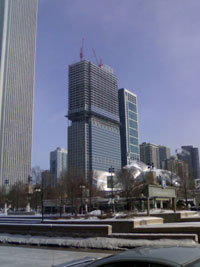The Emerging Traditional Office Myth
 There is a growing and growing myth out there about what some call the “traditional office” but not many people realize it.
There is a growing and growing myth out there about what some call the “traditional office” but not many people realize it.
The myth is that it is alive and well! Office space keeps going up, or in the case of the accompanying photo of the BlueCross BlueShield building in Chicago, it is expanding. The reality, though, is that it is shrinking. As huge corporations lay off people in droves, send jobs overseas or just shutdown, the notion that there is a need for so much space is far-fetched. Even for those organizations who continue to thrive, the need for traditional space is declining.
Why is this? Office space is expensive, and the reality is that it is underutilized. Other than storage, how many hours of the day to employees really occupy their space? Couple this with more and more people working form home or Starbucks or wherever, especially by choice, the picture is clearer about the lack of need for massive office spaces, and the shift away from the traditional office.
Still, I have encountered many people who have not embraced this, and I share these examples.
At my last employer before I went on my own and started Dunkirk Systems, LLC, I had all of the capabilities to work remotely. From VPN connection to all of the software, I could work from home, and did so in the evenings. But during the day I was not allowed to. My immediate manager did though, and others outside of my department did, but I couldn’t. Why? I was told the VP of the group liked seeing people in their cubicles. Granted the cubes had 5-foot walls! But it didn’t matter, it was not an option.
Recently I made a connection with a local high school about possibly bringing on one of their students as an intern. As I work from home, I told them we could arrange to meet at the school, a library or other neutral environment. Their response was pleasant, but since I could not offer their students a “traditional office” experience, I was disqualified from their program. We never got into any details about my business or what I could offer the students. I never got a response from them on my challenge to them to consider the new paradigm of offices.
A friend moved to the southern US from the north recently and I connected with him briefly last week during the day. He told me he had to go as his office was shutting down. I wondered how this impacted him, as he still had the same job, just working remotely. His response was the manager of the group was closing the office due to local snowstorms, which didn’t impact him at all. Even after inquiring to his manager about working as his colleagues dashed through the snow home, he was told the network would be disconnected.
Perhaps these examples will help paint the picture of where offices are going, and feel free to refer these to those who don’t quite get it yet.
Did you enjoy reading this? You are welcome to subscribe to The Hot Iron by RSS feed or by email.

